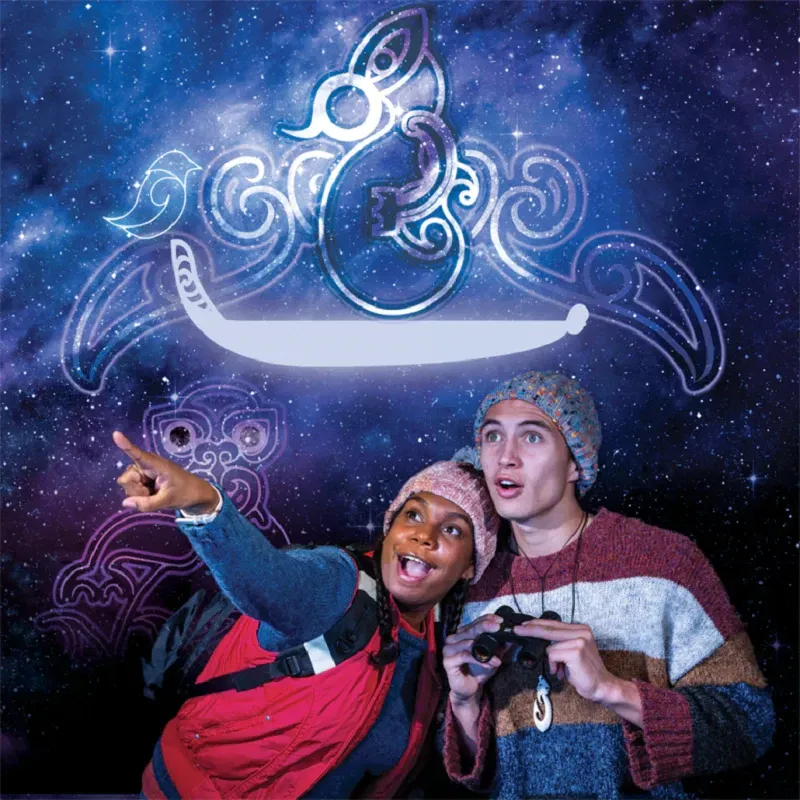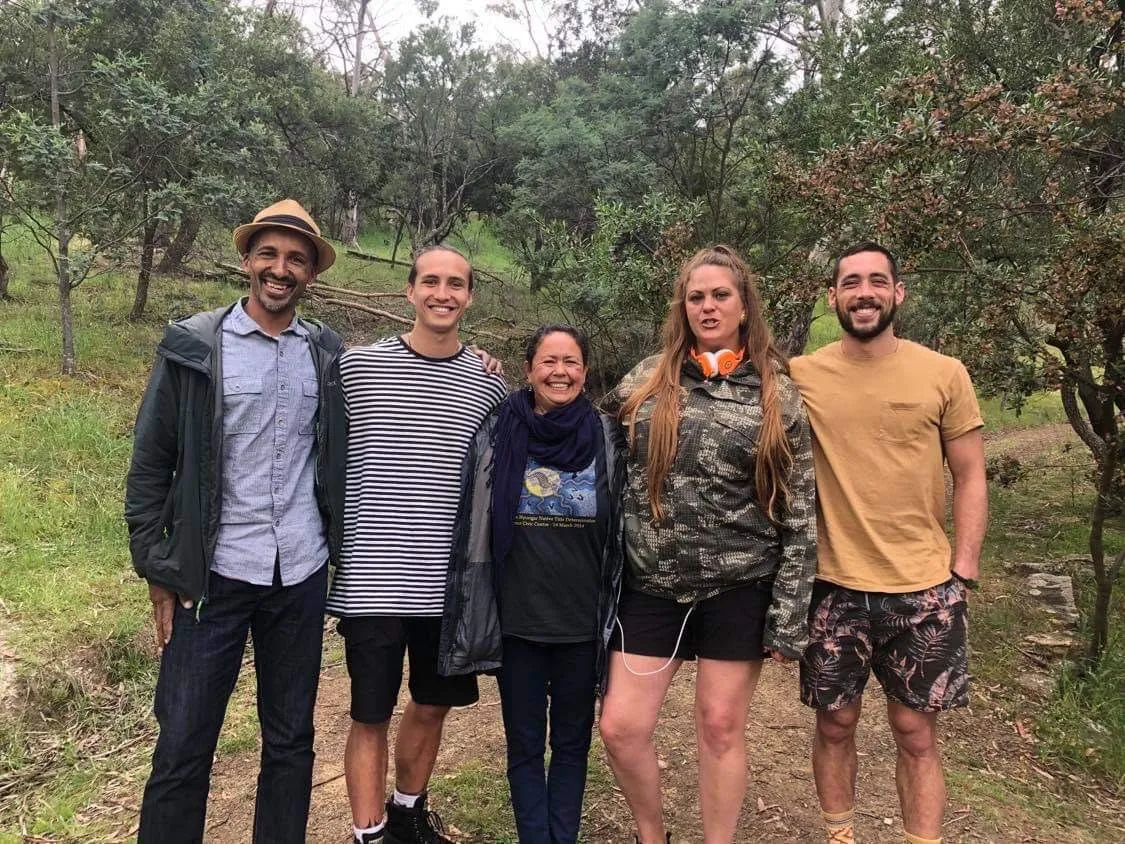Art of the Impossible: International Collaboration During COVID
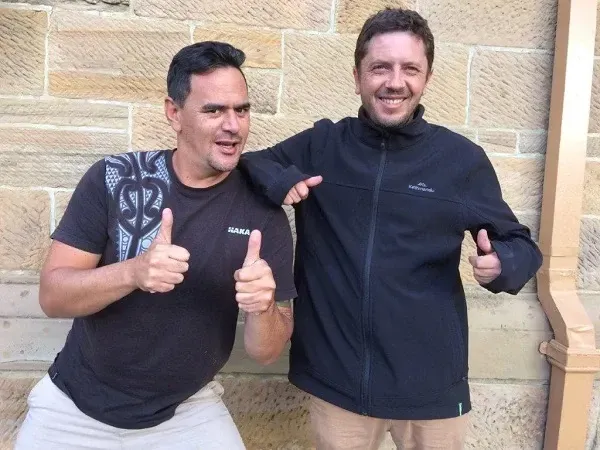
Navigating cultural differences and the intricacies of translation, plus the challenges of budget blowouts and working across different time zones: international co-productions are fraught at the best of times.
Add in a global pandemic, and staging work involving international artists and partners would seem to be impossible – but not quite.
Despite border closures and quarantine restrictions, an upcoming production at Ten Days on the Island - which features visiting artists from Aotearoa/New Zealand - is going ahead despite the disruptions and setbacks their teams have experienced along the way.
COVID’s impacts on Hide the Dog, a cross-cultural, trans-Tasman creation from Indigenous Australian playwright Nathan Maynard and Māori writer Jamie McCaskill have been “enormous,” according to its producer Annette Downs – which isn’t to say they’ve been insurmountable.
“Someone said to me recently that they can’t wait for this year, because last year was dreadful, and I said ‘No, it's just been different.’ World War One was pretty dreadful. But for us – not everybody, for some people it's been horrendous – but through our experience with this particular show, where no one’s suffered from getting COVID, it’s meant a different way of doing things.
“So what can we find that's positive? And what can we manage that’s challenging?” says Downs about her approach to ensuring the show could go ahead.
Navigating quarantine
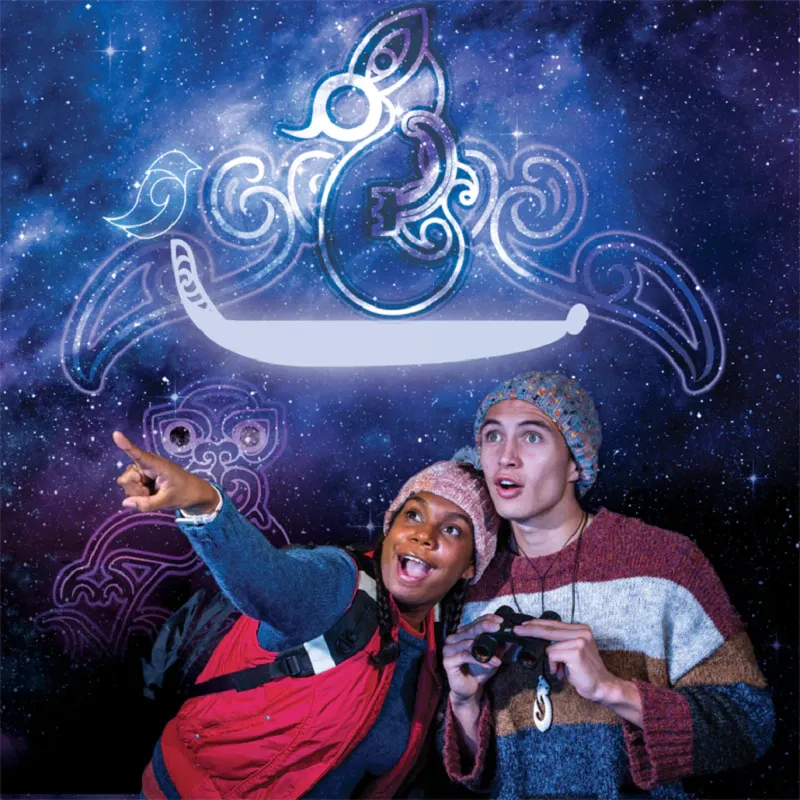
Hide the Dog promotional poster.
Among the many challenges facing the world premiere season of Hide the Dog – a family-friendly show produced by Tasmania Performs, about two children who stumble upon the last Tasmanian Tiger and vow to keep it safe – was the cancellation of its Sydney season in January due to the Avalon cluster on Sydney’s northern beaches.
Even before that, she faced the significant challenge of getting two Māori performers - Zak Martin and Reuben Butler - out of New Zealand and into Australia - with no guarantees they’d be able to get back home.
“The whole point of this exercise, and yes, it’s a children's show, but the point of the exercise was First Nations cross-cultural sharing. So we got lucky with the two performers; we could bring them from New Zealand just in time. The borders opened so they could come across for the rehearsal period for three weeks,” she explains.
“So it was wonderful that they could come, but of course, what happened is we couldn't get them back for Christmas because we couldn't get a quarantine voucher.”
Instead, showing the adaptability that’s a trait of all great producers, Downs told the pair: “I’ll give you the equivalent of what it would cost us to send you home and put you into quarantine and you guys can have a holiday in Australia over the four-week break instead.
“So that was about creative problem-solving. You go, ‘Okay, well, this is a negative, how do I turn that into a positive?’ Both of them had some family in Australia, so that turned out to be okay.
“The budget was still being used to pay for quarantine but I least I turned that from a negative into something that was able to be utilised to keep them in the country … It was an insurance scheme, you know? No matter what, I've already got them in town, they’ll be there.”
Looking on from afar
While the two actors were able to make it to Australia, playwright McCaskill was stuck at home, unable to physically be in the room during late-stage rehearsals.
“The bulk of the collaboration had been done before Hide the Dog was due to be staged, so the biggest impact on my part was not being able to be present during rehearsals to rewrite with Nathan [Maynard] on the floor,” McCaskill told ArtsHub.
“So I had to Zoom in and trust that the process was going well, and that I wasn't being too left out as a writer when it came to telling the stories from a Māori perspective, a New Zealand perspective.
“The impact of me having some kind of hands-on approach to the creative process was affected, but I came to terms with that and that’s the way it was. But if COVID hadn't happened I would have definitely been over there for the final rehearsals to input to the play culturally,” he says.
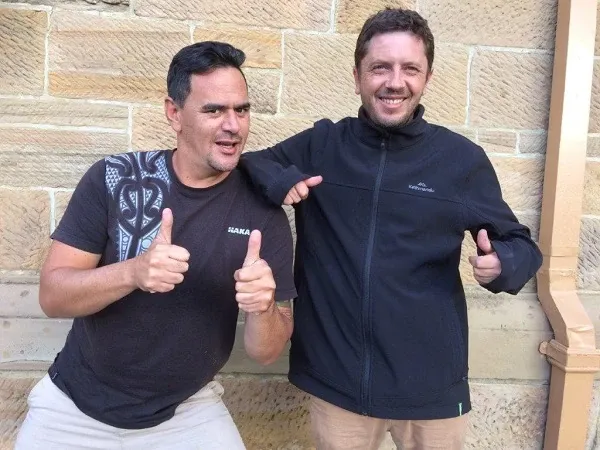
Hide the Dog playwrights Jamie McCaskill (left) and Nathan Maynard. Photo credit: Tasmania Performs.
His absence put more pressure on the New Zealand actors, given that McCaskill was responsible for ensuring the story’s cultural authenticity.
“I talked to one of the actors who was over there, and not to throw too much responsibility on him, but [told him] ‘if big things come up you can call me,’ that kind of thing. So putting it in the hands of other people in some ways, I felt a little bit irresponsible in doing it, but that was what we had to do.”
The costs of COVID
For Downs, producing Hide the Dog in the midst of the pandemic has been “a swings and roundabouts exercise.”
She explains: “I had costed in the composer, the designer and the writer from New Zealand to come and live and work here for three weeks. So that's expensive, because it's accommodation, flights, transfers, salaries, blah, blah, blah. So that was a saving because they were on Zoom instead – a saving monetarily, not necessarily a saving culturally.”
Conversely, there have been unexpected costs in other areas, such as the need to hire a new staff member in order to secure quarantine vouchers through New Zealand’s Managed Isolation Allocation System.
“Things like getting a quarantine voucher to get my artists back into New Zealand after Ten Days? I spent over a week and a half trying to get them, and in the end, I paid someone to sit and stare at a computer screen and hit refresh because basically, randomly, at three in the morning or any old time, someone might decide they're not going to go home and they cancel their flight and their voucher pops up for about a second and a half.
“And there's you and 20 other people who are trying to get home for a funeral or whatever who kind of grab that date. And it's the first click to get the date to get your voucher,’ Downs explains.
‘So in the end, the only way I could get them home was that I paid someone full time to sit at a computer and just look at that screen and hit refresh, refresh, refresh. And he was able to get them both back home after Ten Days on the Island – which hasn't happened yet.’
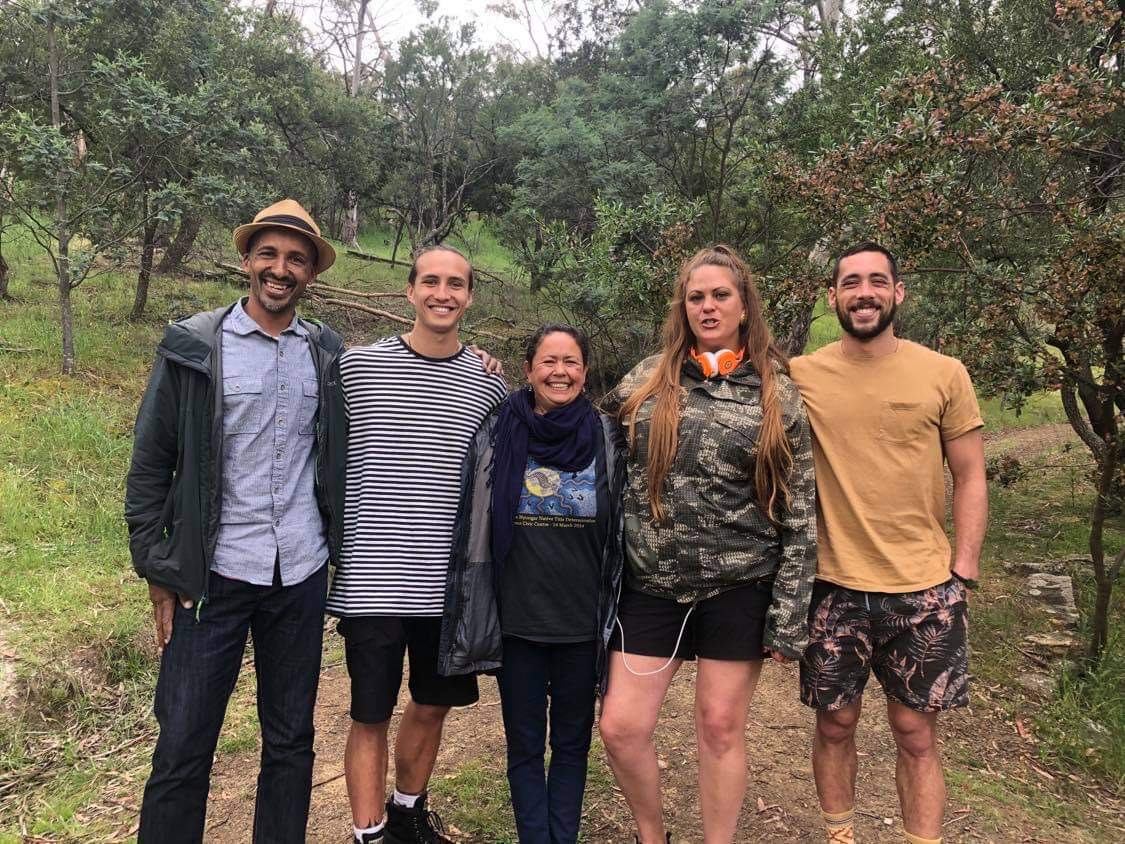
Hide the Dog Māori cast members Zak Martin (second from left) and Reuben Butler (far right) exploring Hobart with cast mates and locals. Photo: Facebook.
Despite the setbacks, there have been some positives to emerge from the process of working over Zoom, such as the experience of sound designer/composer and Māori cultural advisor, Maaka McGregor.
“He said that he'll never leave his sound studio again to go into rehearsal rooms … Normally, he'd sit in the room all day, and then spend all night at home in the studio, making the music. But this way he just had the rehearsal room in his ears and could play along with it, experiment, test things, and then just instantly send them through. So he found it super-efficient and a real discovery,” Downs says.
Similarly, while Zoom can sometimes feel impersonal, it hasn’t impacted the relationship between playwrights McCaskill and Maynard.
“Me and Nathan have a real synergy – so much so that we don't even know who wrote what when it came to the dialogue in the story,” remarks McCaskill.
“You can’t tell the difference between our two voices. So in terms of collaboration, that's something that me and Nathan are both really proud of, and of course, the story that we're presenting.”
Such positives aside, the process of producing Hide the Dog during COVID has been frustratingly unpredictable for Downs.
“We planned within an inch of our lives, all these various scenarios. But even then, you know, normally you've got a contingency, and you can go, ‘Well, this or this or this could happen.’
“But the variations on what could happen for 14 people travelling from different nations to come to one place, the decision tree to try and map that would just make my head spin,’ she says.
“So yes, it was hard. I would say it made it probably more than double the work.”
Hide the Dog runs from 19-21 March at The Theatre Royal, Hobart as part of Ten Days on the Island.
This article was originally published by our friends at ArtsHub Australia.
Written by Richard Watts, ArtsHub's National Performing Arts Editor.
